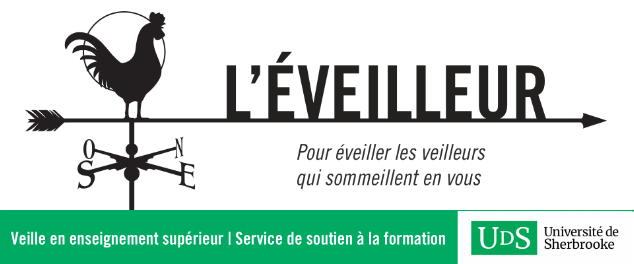Les auteurs de cet article, des gestionnaires de programmes, coprésident la Baruch College Advising Alliance, un groupe de collaboration interunités composé d’employés qui fournissent des services directs aux étudiants. Il s’agit d’un réseau de soutien mutuel conçu pour aider leurs étudiants à réussir, tant sur les plans académique, personnel que professionnel. Baruch College fait partie de la City University of New York (CUNY).
Le début de l’article rappelle de nombreuses statistiques inquiétantes en lien avec la maladie mentale aux États-Unis et dans le monde. On comprend que le personnel de Baruch College a été plus particulièrement éprouvé par le suicide médiatisé en 2014 d’un étudiant de 20 ans en pleine semaine d’examens finaux. Un passage important du texte initial me semble mériter d’être souligné:
As renowned journalist Johan Hari concludes in his latest book, Lost Connections, depression and anxiety hold something in common: “They are all forms of disconnection. They are all ways in which we have been cut off from something we innately need but seem to have lost along the way.” If disconnection is part of the problem, how can we help our students reconnect–to themselves and to others within their communities? The answer to this question will require that we step back and begin to look at students as more than their SAT and ACT scores and high school GPAs, and certainly more than graduation statistics over a six-year period from the moment they enroll at our institutions. (2018b)
Surtout, les auteurs remarquent que, si la maladie mentale n’est évidemment pas l’apanage des universités, de multiples facteurs aggravants sont réunis dans ces institutions. Par exemple, on mentionne la possibilité de toxicomanie, mais aussi le fait que la compétition y est importante et l’échec dévalorisé:
…[A]pproximately three-quarters of mental health disorders manifest by the age of 24, so higher education institutions are among the primary spaces where a confluence of risk factors – the stresses of adjusting to new social and intellectual expectations – can create a crisis. And while heroic efforts are being made in some universities to provide screenings and treatment, very few institutions are able to provide the appropriate resources.
En fait de ressources, les auteurs font remarquer que les ratios psychologues-étudiants sont souvent de 1 pour 1000, 1 pour 2000 ou même 1 pour 3500 dans les plus grandes universités. Il est donc impossible de soutenir adéquatement l’ensemble des étudiants qui vivront de la détresse. On veut donc impliquer l’ensemble du personnel, mais en allant au-delà d’un simple dépliant présentant les ressources disponibles (qui n’est souvent pas lu, d’après les auteurs).
What is needed is a collaborative and institutional approach based on practical training in “relational advisement” – particularly for staff and faculty who interact with students most frequently. This approach has two core principles: building trust with the student and establishing a connection between the student, the adviser and the institution.
L’approche de Baruch College s’appuie sur différents moyens, notamment le fait d’admettre qu’une crise de santé mentale est en cours. Ce qui ne va pas toujours de soi:
The mental health of our students is often taken for granted in discussions about college success, particularly college completion. Colleges and universities are institutions where we can offer a space of respite for students to develop their abilities and where they can explore the world and their place in it. […] How can we help students navigate and balance the benefits of “failure” and facing adversity, while helping them feel safe enough to challenge themselves intellectually and emotionally?…
Un groupe de gestionnaires, de psychologues et d’autres personnels qualifiés nommé la campus intervention team reçoit des rapports pour chaque situation difficile/ à risque (gestes violents, écrits inquiétants, etc.) qui a été vécue et décide d’un suivi [2018b]. Mais la méthode qui semble la plus novatrice et inclusive est celle d’un cours de “premiers soins en santé mentale” d’une durée de 8 h offert à toute personne de la communauté qui le souhaite :
“At Baruch, we have implemented “Mental Health First Aid” (MHFA) training for staff, faculty and students. This is an evidence-based, eight-hour training programme designed to provide participants with the skills to respond to signs of mental illnesses and substance use disorders. […] It is often compared with first aid training since it focuses on training first responders, not experts in medical diagnosis.
Malheureusement, ce cours rejoint peu les enseignants:
…The issue is that while students and professional staff are often able and willing to spend an entire day at a training session, faculty members find it harder to make the time. They need to be compensated for it – especially the adjuncts… […]
Faculty are in a unique position to notice when a student may be experiencing a mental health problem and early intervention can help reduce its severity and impact. But in addition to having as many community members as possible trained in MHFA, processes need to be in place to support them.”
Les auteurs font remarquer que des enseignants qui désirent offrir de la formation à distance sont libérés et payés jusqu’à deux semaines pour suivre une formation appropriée dans cette institution… [NDLR- Deux semaines de formation pour la FAD! Wow.]
Une employée de Baruch College a commenté cet article:
“The training mentioned in the article is incredibly important – especially for those working with students directly. As someone who participated in the MHFA training, I feel more confident in my ability to help students through a difficult time or a crisis. Without an in-depth training, I would not feel as prepared to help a student in need. Recognizing red flags is not the same thing as knowing how to step in. Creating a system of support on campus makes all the difference. While these training cannot (and should not) replace professional counseling staff on college campuses, they can help facilitate an environment of wellness and understanding.”
Sources:
Diaz, Clemente et Douglas A. Medina, “Universities need a communal approach to mental health“, Times Higher Education, 20 septembre 2018a
Diaz, Clemente et Douglas A. Medina, “Instituting a Collaborative Approach to Addressing the Growing Mental Health Crisis in Higher
Education”, Baruch College Advising Alliance (blogue), 17 septembre 2018b (PDF, 6 p.; version longue du même article)





